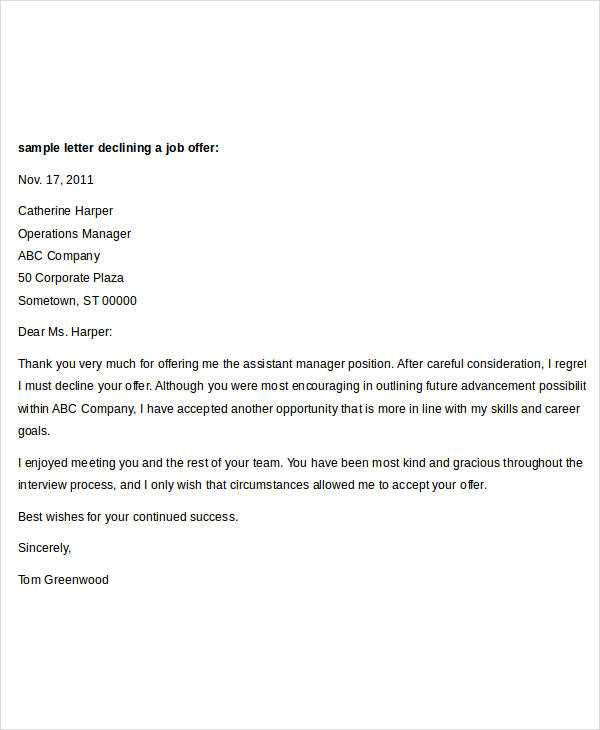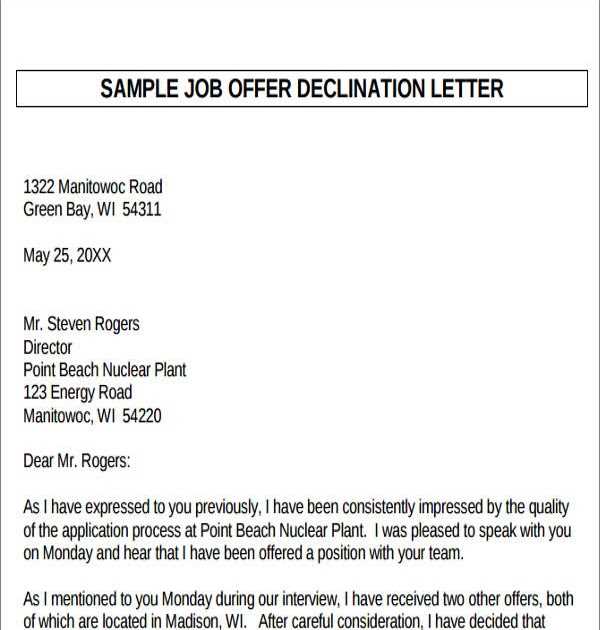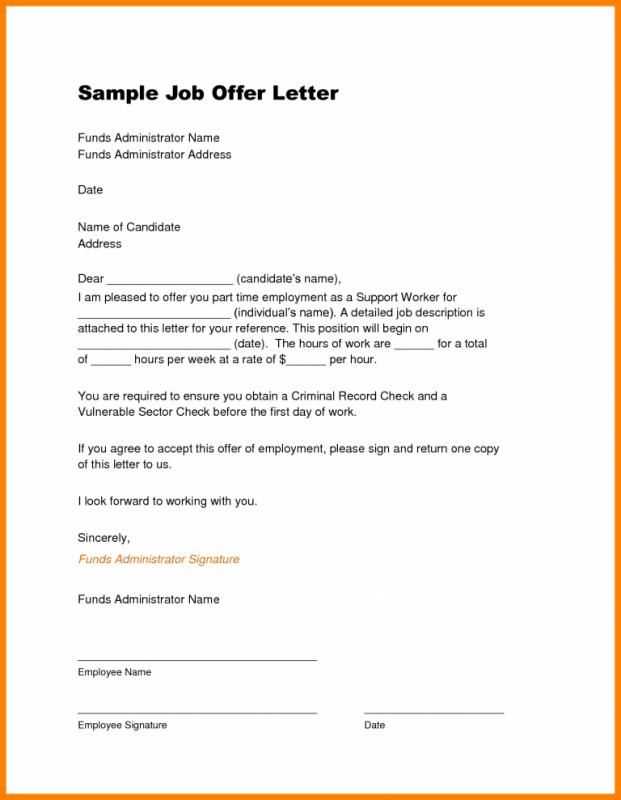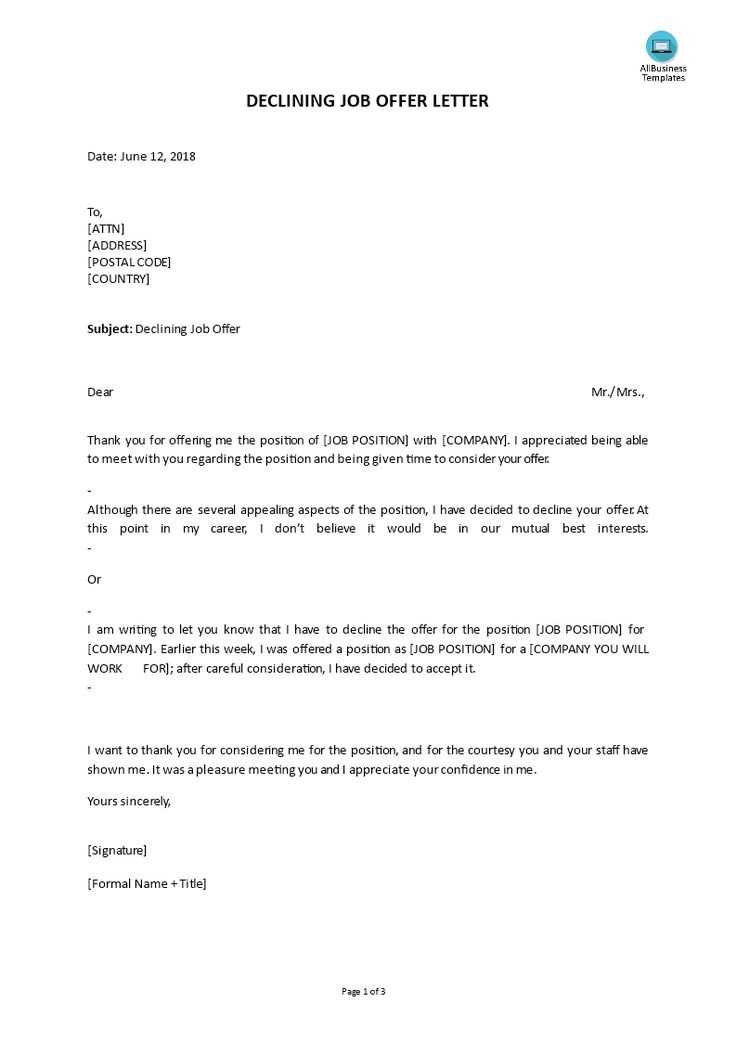How to Decline a Job Offer with a Professional Letter Template

When faced with a decision to not accept a new position, crafting a respectful and professional response is essential. This type of communication reflects your ability to handle potentially uncomfortable situations with grace, while maintaining a positive relationship with the company. Regardless of the reasons behind your decision, expressing your choice thoughtfully is crucial for your future reputation.
Respectful communication during this process can ensure that doors remain open for possible opportunities down the road. It’s important to remain clear and concise while conveying your gratitude for the opportunity, even if you have ultimately decided not to move forward.
In this article, we will guide you through the process of writing a polite response to an employment proposal that you have chosen to decline. By following a few key principles, you can maintain professionalism and leave a lasting positive impression with potential employers.
Reasons to Decline a Job Offer
There are several valid reasons why individuals may choose to pass on a professional opportunity. It’s important to assess personal and professional factors carefully before making this decision. Whether it’s related to the work environment, compensation, or long-term goals, being transparent and thoughtful in your response can preserve your professional reputation.
Personal Circumstances
Personal factors, such as relocation, family obligations, or health concerns, may impact the ability to accept an employment proposal. If the role demands a significant amount of time away from home or if it conflicts with personal priorities, it might be better to turn it down and focus on what truly matters in the long term.
Mismatch with Career Goals

If the position doesn’t align with your long-term career aspirations or doesn’t offer the growth opportunities you desire, it’s reasonable to pass on the opportunity. In some cases, the role may not challenge you enough or provide the kind of professional development you seek, making it a poor fit for your future goals.
How to Write a Polite Rejection Letter

When choosing not to proceed with a professional opportunity, it’s crucial to communicate your decision in a way that is both respectful and professional. A well-crafted response helps maintain a positive relationship with the employer, ensuring that the door remains open for potential future collaborations. The key is to convey your decision clearly while expressing gratitude for the opportunity.
Start by thanking the company for the chance to learn more about the role and for their time. Acknowledge the effort they put into considering you for the position. This appreciation sets a positive tone for the rest of the message.
Next, clearly communicate your decision without unnecessary details. You do not need to go into specifics about why you are not accepting the position, but a brief mention of the reason can make the message feel more personal and thoughtful. Finish by wishing the company success and expressing hope that your paths may cross again in the future.
Key Elements in a Decline Letter
When you decide not to proceed with a professional opportunity, crafting a response that includes the right elements is important. A thoughtful communication should be clear, concise, and respectful, ensuring that your decision is communicated in a professional manner. Including the appropriate details can help convey your message effectively while maintaining a positive relationship with the organization.
Gratitude and Appreciation
Begin by thanking the employer for their interest and the opportunity to be considered for the role. This helps to set a positive tone and acknowledges the time and effort they invested in the hiring process. A simple statement of gratitude shows respect for their consideration and makes the communication more professional.
Clear and Respectful Communication
It’s essential to be direct yet polite in communicating your decision. Briefly explain your choice, but avoid going into too much detail. Offering a short reason for your decision is optional; however, it should always be worded in a way that preserves goodwill. Close by wishing the company continued success in their search for the right candidate.
Maintaining Professionalism in Your Response
Responding to an employment proposal with professionalism is vital for preserving a strong reputation in your field. Even if you are not accepting the role, it’s essential to communicate your decision in a way that reflects your respect for the company and the hiring process. A professional tone ensures that your message is received positively and leaves a lasting impression.
Tone and Language
Always keep your language respectful and your tone neutral. Avoid overly casual phrases and focus on being clear and courteous. Remember that your response might be shared with others in the organization, so it’s important to maintain professionalism throughout.
Timeliness and Respect
Responding in a timely manner shows respect for the employer’s time and allows them to move forward with their hiring process. Delaying your response unnecessarily could be perceived as unprofessional. It’s also essential to convey your decision respectfully, without sounding dismissive or overly negative.
| Professional Elements | What to Avoid |
|---|---|
| Polite and respectful language | Casual or overly informal tone |
| Clear and concise decision | Unclear or vague responses |
| Gratitude for the opportunity | Dismissive or negative remarks |
| Timely response | Delaying or postponing your answer |
Common Mistakes to Avoid When Declining
Turning down a professional opportunity can be tricky, and there are several common mistakes that can impact how your decision is received. By being aware of these pitfalls, you can ensure that your communication remains respectful and leaves a positive impression on the employer. Avoiding these errors helps maintain your professional reputation for any future opportunities.
- Being Too Abrupt: It’s important to be clear but also considerate. Avoid being overly blunt, as this can come off as rude or dismissive.
- Leaving the Response Too Late: Delaying your decision can inconvenience the employer and give the impression of disinterest or lack of respect.
- Over-Explaining Your Reason: You don’t need to provide a lengthy explanation for your choice. A brief, polite statement is often sufficient.
- Using Negative Language: Avoid sounding negative or critical about the company, the role, or the hiring process. Keep your tone positive and constructive.
- Failing to Express Gratitude: Failing to thank the employer for their time and consideration can leave a bad impression. Always show appreciation for the opportunity.
By steering clear of these mistakes, you can ensure that your response remains professional, respectful, and leaves the door open for future interactions.
Alternatives to Rejecting a Job Offer
Sometimes, turning down a professional opportunity may not be the best choice, especially if the role or company presents some appealing aspects. Instead of outright rejecting an offer, there are other approaches you can consider to negotiate or adjust terms, allowing you to make a more informed decision or retain a possible future connection.
Negotiating Terms

If certain aspects of the position, such as salary, benefits, or work schedule, are not ideal, you can try negotiating. Many employers are open to discussing adjustments, and in some cases, you may be able to come to an agreement that makes the role more attractive. Being open and flexible can lead to a mutually beneficial outcome without the need to turn the opportunity down completely.
Requesting a Deferred Start Date
If the timing of the opportunity doesn’t align with your current commitments, you may request a delayed start date. This could provide you with the flexibility needed to manage personal obligations or professional transitions, allowing you to accept the position at a later time. Most employers appreciate candidates who communicate openly and are willing to consider alternative arrangements.